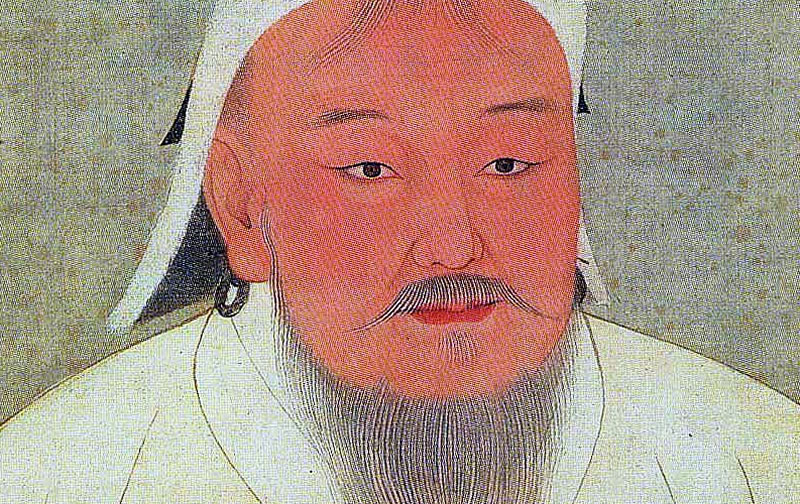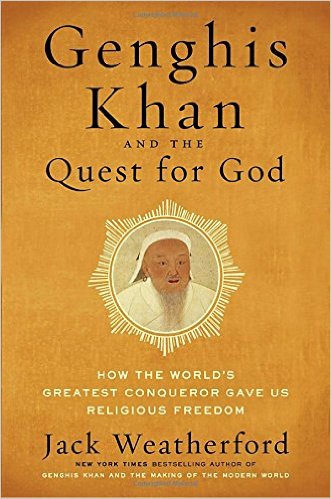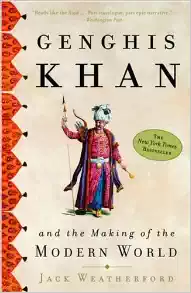
14th century portrait of Genghis Khan. Source: Wikipedia.
By Jack Weatherford, republished with permission | In stark contrast to the United States, with its scattered mini-wars around the globe, Genghis Khan always fought with one single, clear goal: victory. Total victory, not a qualified, partial, negotiated or hyphenated victory.

Weatherford
Since the opening of the 21st century, the United States has been engaged in ill-defined and metastasizing wars in Afghanistan, Iraq and Syria, the very countries where the Mongols were most successful. The Mongols conquered each of these countries in a matter of months, destroyed the notorious terrorist Cult of the Assassins based in the mountain fortresses of northern Iran, and wiped out all pockets of resistance to Mongol rule. They also famously killed the Caliph, a transgression which Osama bin Laden believed to be unforgivable.
The Mongol conquests, harsh and bloody as they were, produced an unprecedented century of peace and prosperity in the Middle East in precisely those countries where the sustained might of America has not managed to produce even a single day without the killing of children, bombing of hospitals, gassing of civilians, and dislodging of a perpetual stream of refugees that are now dangerously destabilizing Europe.
Genghis Khan’s Mongol nation consisted of only about a million people, roughly half the size of the McDonald’s workforce today, and his army had only 100,000 warriors, a number that could easily fit in a modern Olympic stadium. Yet with this army he not only conquered but ruled hundreds of millions of people. The United States has more than three hundred times as many people, its total military force is nearly twenty times that of Genghis Khan, and its budget and technology are infinitely greater. The Mongols fought with bows and arrows against the far more sophisticated empires of China and Khwarzim. Why were the Mongol wars so successful in Baghdad, and we so remarkably unsuccessful?
Americans would not think of looking to Genghis Khan for lessons on war, life, or much of anything because we generally believe that unlike heroic western conquerors such as Alexander, Caesar, and Napoleon, he was an Asian barbarian who could not possibly teach us anything. In the modern West it seems ludicrous to present an illiterate nomad as equal to the great conquerors and law givers of European history. Yet there was a time, even in the West, when he was greatly respected. Geoffrey Chaucer called him a “noble king” and wrote that “there was nowhere in no region so excellent a lord in all things.” Thomas Jefferson collected biographies of Genghis, and Edward Gibbon praised him.
 Most people today perceive his victories as the result of brutality, and it is true that he used scorched-earth tactics to subdue his enemies. But if brutality alone were enough to secure a lasting victory, the United States would easily have easily conquered every country we have been at war with since Korea. As much as we would like to dismiss his victories, they arose from clear thinking, planning, and implementation, three commodities woefully lacking in American policy makers and war makers.
Most people today perceive his victories as the result of brutality, and it is true that he used scorched-earth tactics to subdue his enemies. But if brutality alone were enough to secure a lasting victory, the United States would easily have easily conquered every country we have been at war with since Korea. As much as we would like to dismiss his victories, they arose from clear thinking, planning, and implementation, three commodities woefully lacking in American policy makers and war makers.
What did Gibbon and Jefferson see in Genghis Khan that we can no longer see? Genghis Khan’s success can be summarized in five critical concepts by which he conquered, and more importantly, by which he successfully ruled and brought peace and prosperity to his subjects.
- Total Confidence:Genghis Khan never attacked unless he knew that he could win. He prepared his army, gathered extensive intelligence about the enemy’s army and social divisions with its society. If he could not win, he postponed the attack, sometimes for years, but he never forgot and never abandoned his goal. He instilled the same confidence in his people, and most importantly in his army. They had confidence that if he declared a war, they would win it quickly and efficiently and no matter how many fatalities they inflicted he would do everything to minimize loss of life for his soldiers. Genghis Khan had confidence in his people, and they showed total confidence in him.
- Clarity: Genghis Khan was totally clear about his objectives in war and peace, and he made them equally clear to his enemies as well as to his followers. When he attacked, he gave his foe only one viable option. Like the Americans in the war against Japan and German in World War II, the choice was total and unconditional surrender or annihilation. Just as the Allies fire bombed Dresden and Wurzburg in Germany and Americans dropped atomic bombs on the women and children of Nagasaki and Hiroshima, Genghis Khan unleashed ferocious violence on civilian populations. If they fought him, he annihilated them, but if they surrendered he faithfully kept every promise and protected them from every predator.
- Choices: Genghis Khan never attacked without making clear to the enemy the reasons for the attack and the benefits they would have if they surrendered without fighting. While American presidents throw out a mystic fog of restoring democracy, respecting human rights, emancipating women, and building a new world order, Genghis Khan offered very specific benefits through his personal envoys and through messages attached to arrows shot into enemy cities. He outlawed the kidnapping and sale of women, ended taxes on religious institutions and public service occupations such as doctors and pharmacists, guaranteed religious freedom to every person, and always fulfilled his threat to execute any corrupt official or thief. If his enemies surrendered, there would be no increase in taxes and for many, especially merchants, a sharp decrease. He guaranteed the return of lost property, and he created as system of routes and bridges with caravan stations to facilitate travel and commerce. The consequences for refusal to surrender were the vague but ominous Mongol refrain, “the sky knows.”
-
 Consequences:Although the wording of the Mongol threat was vague, the consequences were frightfully clear. First, he killed all the leaders who resisted him, as well as their heirs, the aristocracy, and the entire ruling establishment. He did not try to persuade his sworn enemies, humiliate them, co-opt them, or incorporate them into his empire. He knew that they would be a constant source of problems and resistance. And if they had not been able to lead their people to victory over him, they were of no use. He killed them. The same applied to the enemy army. He had no place for them. The old elite was destroyed, but he spared almost everyone with a skill—whether it was weaving, metalwork, pottery, or knowing how to read and write or translate between languages. Those without skills were used as cannon fodder in the next campaign, digging ditches, serving as living shields for Mongol warriors, and performing any job too degrading or dangerous for a Mongol.
Consequences:Although the wording of the Mongol threat was vague, the consequences were frightfully clear. First, he killed all the leaders who resisted him, as well as their heirs, the aristocracy, and the entire ruling establishment. He did not try to persuade his sworn enemies, humiliate them, co-opt them, or incorporate them into his empire. He knew that they would be a constant source of problems and resistance. And if they had not been able to lead their people to victory over him, they were of no use. He killed them. The same applied to the enemy army. He had no place for them. The old elite was destroyed, but he spared almost everyone with a skill—whether it was weaving, metalwork, pottery, or knowing how to read and write or translate between languages. Those without skills were used as cannon fodder in the next campaign, digging ditches, serving as living shields for Mongol warriors, and performing any job too degrading or dangerous for a Mongol. - Consistency:Genghis Khan was consistent in keeping his promises and establishing law and peace. The Persian chronicler Juvaini wrote that a virgin with a pot of gold on her head could walk from one end of the Mongol empire to the other without fear of molestation. When Genghis Khan made war, it was total war, and when he made peace it was total peace. He was as steadfast and consistent in his rule as he was in battle.
As strict as his principles were, Genghis Khan also recognized the need for practicality, constantly learning through experience and adapting to changing conditions. When circumstances warranted it, he made exceptions for his harsh conquests to single out particularly virtuous or brave foes. When an enemy warrior attacked him and shot his horse out from under him, Genghis Khan demanded that his would-be killer identify himself. Fearing a certain and horrible death, the man stepped forward. Genghis Khan made him a general in his army, knowing that a man brave enough to attack the enemy leader and to admit it was worth having in his service. The warrior was renamed Jebe, after the type of arrow he used to kill Genghis Khan’s horse, and he became one of the Mongol’s greatest generals. Similarly, when Genghis Khan defeated his rival Wang Khan of the Kereyid tribe, he saw that the old khan’s bodyguards fought fearlessly even when they were certain of defeat. After the battle, Genghis Khan asked them to join his bodyguard, knowing that they would do the same for him as for their fallen leader.
Genghis Khan established a century of peace, but he did not accomplish this through the might of his army or through the crushing defeat of his enemies. Peace lasted because he offered the common people a better life under Mongol rule, and allowed them guarantee to follow their traditional culture and religion without fear of persecution. He did not try to shape them into Mongols.
Confidence, clarity, choices and consequences, and consistency were his most effective weapons. America lacks all of these in its poorly focused and seemingly random efforts at fighting terrorism around the globe. Our leaders speak loudly but incoherently, and they react harshly but ineffectively. Our next president could learn a lot from Genghis Khan.
Jack Weatherford, a Darlington County native, is the author of the new, critically-acclaimed book, Genghis Khan and the Quest for God, as well as the popular Genghis Khan and the Marking of the Modern World. A former anthropologist at Macalaster College in Minnesota, he divides his time between Mongolia, Charleston and Bolivia. This column, originally published in The Daily Beast, is republished with the author’s permission.
- Have a comment? Send it to: feedback@statehousereport.com.



 We Can Do Better, South Carolina!
We Can Do Better, South Carolina!
























